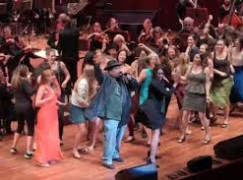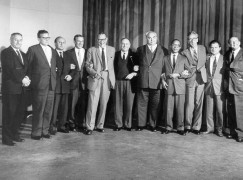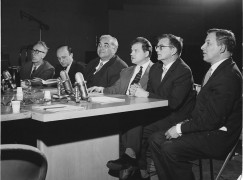We have received complaints from unpaid performers in the 2013 Chicago Beethoven Festival. Here’s one:
I would like to point your attention to the Chicago Beethoven Festival organized by Mr. George Lepauw. I participated in the organization of the 2013 edition and unfortunately we faced strong problems, both financially and in the way musicians were treated.
Many of the artists playing in the symphonic and the chamber orchestra were not paid or were barely paid (less than 25% of their fees) and are still waiting for their pay checks. This applies also to the ones who had to pay their own travel tickets. Moreover, Merit School (the provider of the location) and the Chicago Children Choir are also waiting for their dues.
Musicians agreed not to sue Mr. Lepauw as long as he promised he won’t organize another festival until all dues are paid. However, it seems like this promise is being broken as the 2014 edition has just been announced.

We approached Mr Lepauw, a former Chicagoan of the Year, for a response. Here’s his robust account of events:
The International Beethoven Project’s last Beethoven Festival: LOVE 2013, which ran September 7-15, unfortunately ran a deficit. The Festival experienced a combination of factors which unexpectedly led to the discrepancy between expenditures and income: of note, certain expected donor pledges did not come in; ticket sales for the orchestra concerts (the most expensive of the festival) conducted by Matthias Pintscher were dismal, and several unexpected cost overruns occurred as well. The total cost of the festival was in the four-hundred-thousand dollar range, while the festival brought in approximately three-hundred-thousand dollars through ticket sales, donations, grants, advertising, and sponsorships. Without a reserve or an endowment to reach into under such circumstances due to the fact that we are still a very young organization, we were left with a sizable debt by the end of the event.
There has been no attempt to hide the facts from anyone; communication with those to whom IBP has owed fees has been clear and we have openly discussed our abilities to repay them, as liquidity has allowed. It is important to note that the large majority of festival participants have been paid as agreed, while most of those still owed have been partially paid, within our ability to do so. Several festival artists, when made aware of the deficit, generously donated their fees back through passion, faith, belief, in support of the project, although I have certainly never asked anyone to do so.
It is also important to note that the entire organization is run by volunteers, most of them working artists, myself included.Not a single administrator takes payment for their work for IBP.
The current attention to this situation by the press is no scoop nor any indication of a disagreement on facts: I am 100% in agreement with those who are owed monies as to the amounts owed and as to the commitmentof repayment. In fact, the social media explosion that led the press to pick up on this story over the last few days was not begun by any musician to whom IBP owed a fee, but by musicians who were paid on time back in September, and to whom IBP has been loyal since 2011. They have started a campaign of misinformation and blurring of facts that is counterproductive to the intent of repaying musicians.
I have always been, and still am, a musician’s advocate, and am extremely grateful to all the musicians who have been patiently waiting for their dues, and who have been supportive of us throughout this difficult period and have not complained on social media about it. I am also extremely grateful to all the musicians, donors, partners and others who have called me personally to assure me of their personal support in the last few days and urged me to stay the course.
In fact, by far most people that have ever been involved in this festival over the last three and a half years have raved about it and feel, as I do, that it is one of the most important new projects on the scene. Audiences are engaged, excited, and growing year by year, in a market that is extremely slow-growth, and most of our success, in spite of all marketing monies expended, has come from word-of-mouth. I along with an incredible roster of caring, amazing volunteers, have dedicated our lives to the success of this project since the start of our inaugural festival’s preparations in June 2011, at great personal expense, and with no other reward than to see a renewal in the arts and better opportunities for artists. A festival that started with fifty-thousand dollars and that raised over three-hundred-thousand dollars barely two years later, even if below projections, is still an incredible story of success.
I never thought that starting a festival from scratch and leading it to its ideal version would be easy, but the fact that it is still growing, that it is bringing people together of many different cultures, races, and generations, the fact that it has proven itself to be an unparalleled platform for artistic experimentation, the fact that it asks artists to be their truest selves and not have to fit into a dictated mold, the fact that it promotes art as asocietal imperative and shines a light on Chicago’s creative scene, the fact that it was started by working musicians with a dream for a new approach to the live arts, with only passion to convince participants and donors to engage, the fact that it has consistently produced a top-notch artistic product year by year, is proof of its upward trajectory and hard-won, step-by-step success story.
We could have chosen to declare bankruptcy last fall had we not had it in us to fight for our survival, in order to honor our debts and our continued dream. After a difficult period, in which we restructured much of our organization in order to steer clear of the mistakes and events that caused our deficit, we are now stronger than ever, and extremely well-positioned to move ahead with plans for our fourth festival. And why are we planning another festival when we have not completed the last payment from 2013? IBP’s only product is its annual festival, and without a product to promote, we lose our ability to leverage the purpose of our organization with our ability to raise funds. Our loyal and supportive donors, who believe in our mission, want to see us go forward, and are supporting us in our quest. Most loyal donors are giving more than they did last year in order to help us as best they can overcome our current challenges. We have also made significant changes to the economics of our festival compared to last year’s edition: indeed, we have managed to cut our costs by two-thirds through greater collaborative agreements with our presenting partners, and by canceling orchestra concerts from the roster, which were our heaviest burden over the last years, and which, despite their tremendous quality, did not attract much press attention and therefore enough ticket-buyers. We are still committed to a world-class virtuoso orchestra in our festival, but will not present this aspect of our project until we have secured a committed sponsor willing to assume the financial risks of our orchestra. The much-reduced cost of the upcoming festival, along with the increased ticket-revenue we expect (in line with growth percentages of years past, and based on the fact that our box-office has now been open for more than a week, nearly two months ahead of last year’s box-office schedule), and our proven ability to raise well over a quarter-million dollars per season, are all solid indicators of our ability to run a festival and repay our remaining debts over the summer months. We are positioning ourselves to grow and continue our important work, which will, with continued support from artists, donors, civic partners and others, guarantee a festival with well-paid musicians in future years.
Lastly, I make my living as a performing and teaching musician. I am a third-generation professional musician, with both my father and grandfather having made careers as orchestra musicians. I grew up being keenly aware (and participant) of the hard work musicians put up for unequal financial returns, and I always wanted to contribute to the movement for a change of society’s valuation of its working artists. It is a long-term process, and a highly imperfect one at that. However, that message is increasingly coming across in Chicago, and with a little more support and time, these goals, shared by many, will be realized in this part of the world.
I once again thank all the musicians for their dedication to their craft and their passion and contribution to this festival, and once again reiterate that all debts are in process of repayment, and will be repaid to the last dollar as promised despite the unfortunate but honest delay. And I continue my work to appeal to sponsors and donors for continued and new support, along with audience participation which can, by purchasing all available tickets, pay for the cost of this entire festival. As always, I make myself entirely available to anyone with questions. I hope this statement, made from the heart and based on hard facts, allows my volunteer team and I the opportunity to return to the immense work at hand of financing, organizing, and promoting the next festival. I would also hope that people who are not aware of the facts refrain from snowballing a situation which has been open and honest from the start with those it concerns directly.
My email is available to anyone who wishes to communicate with me directly, and I put it out here once more: george@
—
President and Artistic Director
International Beethoven Project & Beethoven Festival











